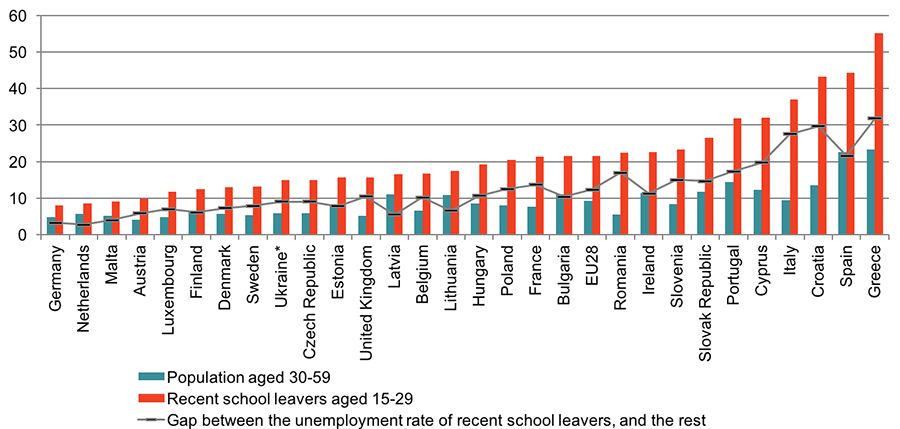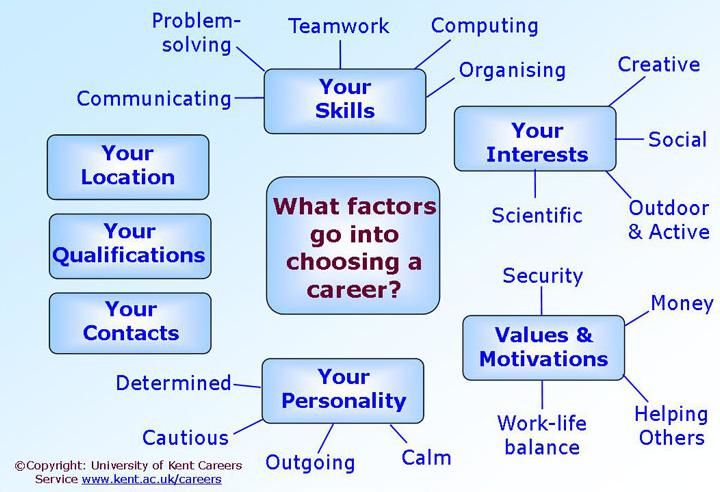Efficient career self-management allows people to unlock their potential and find better job matches, thus likely raising output and welfare. However, while in some countries career guidance is an inherent element of the school curriculum (for example in the Czech Republic, Finland, Germany), in Ukraine school-level career planning is less developed. In this column, the author analyzes the level of career planning in Ukraine and suggests steps which can reduce youth unemployment.
Would you like to build a career you dream about? If you start early enough, set a proper goal and make a good plan to achieve it, then building a desired career should not be a problem. If so, doesn’t this mean that teaching children to plan their career substantially increases their chances for success?
Career guidance can play an important role in meeting the needs of labour market and one’s career goals. Efficient career self-management allows people to unlock their potential and find better job matches, thus likely raising output and welfare. However, while in some countries career guidance is an inherent element of school curriculum (for example in the Czech Republic, Finland, Germany, South Korea, Norway, and the United Kingdom), in Ukraine school-level career planning is less developed (at most, elective courses in some schools).
Underdevelopment of career planning has both explicit and implicit costs. Explicit costs include youth unemployment and skill mismatch. Over the last decades the youth unemployment rate in Ukraine has been the highest among all age groups: 15.7-23.1%. In addition, about 30% of Ukrainian youth is overeducated for the positions they work at and jobs of 52% of youth do not correspond to their specialization. However, temporary youth unemployment is not the only cost of poor career planning. As found by Cruses et al. (2012), youth unemployment leads to deterioration of human capital, since the unemployed youth proved to be systematically worse in labour market when reaching adult ages. Similarly, skill mismatch leads to deterioration of skills that are not applied at work. Unemployment also leads to higher unemployment benefits and lost tax revenues due to lower income. Additionally, it is a lot harder to measure effects such as higher susceptibility to long term unemployment and crime as well as poorer health outcomes. Altogether these problems can tangibly contribute to the economic underperformance of Ukraine.

Interestingly, problems of youth unemployment and skill mismatch exist in the society where almost one-half of youth has higher education or studies at that level and only 1.7% of those aged 15-29 have just elementary education. Moreover, for about two-thirds of Ukrainian university students, higher education is merely a question of prestige, since 62.3% of School-to-Work Transition Survey (2013) respondents mention that they would not agree to pursue vocational education even if they could have higher wages and more stable employment there. This suggests that Ukraine spends 6.1-7.3% of GDP on education ineffectively because a large portion of skills is wasted. However, developing career guidance can make a difference.
According to the concept of state system of career guidance approved in Ukraine in 2008, Ministry of Education and Science is responsible for career guidance of preschool-age and school-age children as well as studying youth. Since 2008 several elective courses of career guidance for 8-11 grades were developed and approved by Ministry of Education. Even though the development of these new courses is an improvement, it has quite a limited impact on career literacy of Ukrainian schoolchildren, since the courses does not cover all younger children and are an elective element of school curriculum. Therefore, career guidance which schoolchildren of 1-7 grades gain at school is mainly optional and non-systematic lectures by a form-master, deputy principal and school psychologist. At the same time, OECD defines career guidance as services aimed at people of any age, not only of those elder than 13-14 years old as in case of Ukraine.

How economic underperformance in Ukraine and lack of career guidance for Ukrainian school children are related? Basically, there are two major links – human capital development and productivity.
First, child and career development theories claim that is it never too early to plan child’s career path. Early career planning allows a child to consider alternatives, set goals, make plans how to reach those goals, asses the success in reaching the goals – all these skills are invaluable for successful adult life (Magnuson, 2000). Obviously, starting this process a few years later leads to less effective utilization of child’s development potential. Certainly, it is expected that parents play the primary role in children’s development. However, the economic situation in Ukraine is such that parents themselves are unable to plan their career paths effectively, and, thus, they are unlikely to help their children in this process.
Second, since the job satisfaction is associated with higher job productivity, working on non-matching job is expected to reduce the work efficiency. Bockerman and Ilmakunnas (2010) find that the increase of job satisfaction by 1 point on scale 1-6 is associated with up to 20% higher value added created by employee per hour. Given that a large share of Ukrainian population works at positions that do not fit their education or qualifications due to the lack of matching jobs, one may reasonably expect that work dissatisfaction reduces labor productivity at the aggregate level. As a result, career guidance can help enhance labor productivity by improving a match between workers and jobs.
To understand the necessity of proper career guidance starting from early age, let’s consider the possible content of career planning course that can be provided in Ukrainian schools through all years of studying. I suggest that career planning at school should be organized in the form of mandatory non-gradable course (similarly to Canada, Denmark and Finland as stated in Education Policy Report (OECD, 2003)). The course should be aimed not only at making children think about their future seriously, but also learning how to apply basic self-management techniques to solve problems encountered in their lives. Improved self-management is an important benefit, since there are very few alternative methods of soft-skills development at school. The frequency of lessons should be arranged in correspondence with the age of schoolchildren – the older children are, the more often lessons should be held. For example, in primary school one class per quarter could be enough, while for graduate students classes could be held once per two weeks.
The tentative list of questions to be considered in career planning course:
- why it is so important to have a job and take this choice seriously;
- “career days” – in-class meetings with children’s relatives and family friends to share the peculiarities of their jobs;
- learning and discussing the information about any professions of interest;
- on-site visits of some organizations to see the work from inside;
- running psychological tests about the most suitable profession types;
- finding educational institutions (professional schools, vocational schools, colleges, universities) where the particular professions can be mastered and learning corresponding entrance requirements;
- making an outline of life-career plan and updating it regularly;
- learning the current job-market situation;
- studying information where people with particular professions can be employed;
- preparation to continue the education in post-school institutions.
Within each block of the course role-plays “employer-employee” could be provided to allow children to get used to the idea of working and make them more tolerant to employers. Different teachers, professionals as well as school psychologist should be involved in the course.
Even though introducing a career planning course is attractive in many ways, one should ask how much it would cost to implement such a program. Pricewaterhouse Coopers estimated that a good career guidance program at middle school in Great Britain would cost less than 1% of the school’s budget. Assuming that the cost of school career guidance in Ukraine is commensurate with the one in Great Britain, the benefits appear to outweigh the investment substantially, especially considering how much career guidance can prevent deterioration of youth human capital.
Yogi Bhajan said, “You are very powerful, provided you know how powerful you are”. Then why don’t we let Ukrainian children comprehend all the power they have to build their lives?
The winner of MindSketch January Competition
Attention
The author doesn`t work for, consult to, own shares in or receive funding from any company or organization that would benefit from this article, and have no relevant affiliations



